Interreg Europe GREENHEALTH – six months after the Kick-Off Meeting

Six months ago, on the 11 of May, we reported on the Kick-Off Meeting of the Interreg Europe GREENHEALTH in Murcia, Spain.
The GREENHEALTH project wants to create linkages between health and environmental policies and incorporating human health initiatives into Protected Area programmes.
The first six months have been ones of intense work, dialogue, capacity building and communication among the partners and with key stakeholders. The first exchanges and intentions were established at regional level to trigger and showcase the potential that each region can generate in the field of biodiversity and health.
What happened in the cooperating regions?
Each partner institution established the so called “Local Living Labs” (LLL) in their region or area of operation. LLL are “spaces” where each project partner can meet their key stakeholders and discuss the existing and potential initiatives that can take place in their area of operation both in the short and long term.
Each project partner organised two Local Living Labs in their own region. If the first LLL was about introducing the project to key interlocutors, the second one focused on sharing the knowledge of what are the existing initiatives in the regions and which potentials are still not exploited or are under-utilised. What are the strengths, weaknesses, opportunities and threats for each region? Each partner conducted a SWOT analysis alongside a regional study.
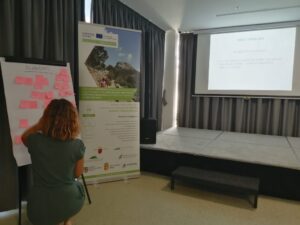
The methodology to create this baseline was developed by EUROPARC Spain, in consultation with EUROPARC Federation and the HPHPe Commission. EUROPARC Spain has supported the Lead Partner technically and is also consolidating the results emanating from each region. An online creative thinking and discussion forum took place at the end of October to discuss the preliminary results of the analysis, which is the base for a roadmap.
Most project partners also organised regional launching conferences.
The role of EUROPARC Federation and the Healthy Parks Healthy People Europe (HPHPe) Commission
But what did the work of EUROPARC Federation consisted on in the first semester? And what was the contribution of the HPHPe Commission to the project?
EUROPARC Federation is advisory partner for communication, capacity building and engagement.
The HPHPe Commission strongly backed the partnership by providing training during the Kick-Off-Meeting and through an online session on the HPHPe programme and toolkit. The latter represent a compass, which underpins the GREENHEALTH methodology to identify good practices in different regions. The HPHPe tools are also showcasing the enabling cooperation factors to effectively implement regional initiatives triggering health and biodiversity outcomes alike.
On the communications side, EUROPARC Federation supported the consortium by developing a first communication strategy.
The main deliverables include (but are not limited to): the establishment and upkeep of Social Media channels (Instagram, X and YouTube), the first newsletter and project video (both in six languages), the organisation of two online sessions for partners on communication and stakeholder engagement. The project website, hosted by the Interreg Europe Programme, was also populated and updated.
To share information about GREENHEALTH within our network, we took the chance to give information about the project during the EUROPARC Conference 2023 marketplace and provided a session about Wild Ways Well to Wellbeing in the HPHPe walk-shop.
What now?
EUROPARC Federation, hand-in-hand with the HPHPe Commission is preparing for the first Inter-Regional Learning Event in Croatia. Here the partners will have the chance to showcase best practices from their regions in the first thematic area of the project “Management of Protected Areas”.
Update December 2023: the Event Report is being finalised.
Stay tuned and check https://www.interregeurope.eu/greenhealth
Join the HPHPe online community!
We have a LinkedIn group and are happy to have you onboard 🙂
The Nature Restoration Law is alive
After months of discussions, on 09.11.2023, the EU Parliament, Commission and Council have concluded discussions on the Nature Restoration Law during the so-called ‘trilogue negotiations’.
The Nature Restoration Law is closer to becoming reality
Late Thursday night, the intense negotiations between the EU Parliament, Commission, and Council concluded on the eagerly awaited Nature Restoration Law, resulting in a political agreement between the three institutions. So, where does this leave Protected Areas?
EUROPARC is pleased to see that after the trilogue negotiations some core elements are back in the legislative proposal. In particular restoration measures won’t be exclusively implemented in Natura 2000 areas and restoration targets for farmlands and drained peatlands are again part of the proposal. For Protected Areas this means confirming their role to plan and manage nature restoration and at the same time to inspire, with good practices, broader landscape restoration processes outside of their borders, successfully reconciling biodiversity conservation requirements with the productive function of agricultural landscapes.
Says EUROPARC President Michael Hošek. He continues stating that:
While the proposal contains many exceptions and reduced ambitions over a longer period of time, it is still a powerful tool. Its implementation will ultimately be a matter of agreement with the EU Member States, and their approach will determine how the Nature Restoration Law will be implemented to successfully achieve the targets set. And in this respect we, as the EUROPARC Federation, are ready to support the whole process.
Earlier this year, EUROPARC joined 210 other civil society organisations in a call upon all EU Member States, Members of the European Parliament and the European Commission to urgently adopt a strong Nature Restoration Law that is fit for purpose to tackle the twin biodiversity and climate crises.
Read EUROPARC’s previous article on the #RestoreNature campaign
The agreement reached must now be endorsed by Member States, as well as undergo a crucial vote by the EU Parliament’s Environment committee. If the proposal successfully navigates these steps, it will subsequently go through a final rubber-stamp vote during the Parliament’s plenary vote, expected to take place in December 2023.
We now call on Member States and the EU Parliament to approve this trilogue agreement, and not delay the much-needed restoration work that will help the EU fight the climate and nature crisis.
Honouring Herr Köpp with the Alfred Toepfer Medal
Michael Hošek awards Dr. Matthias Köpp the Alfred Toepfer Medal honouring his late father at the EUROPARC Conference 2023. Picture: PDF-Grafie
The Alfred Toepfer Medal, named after the founder of the EUROPARC Federation, Dr h.c. Alfred Toepfer (1894-1993), is awarded annually in recognition of a particular individual who has made a significant contribution to nature protection in Europe. In 2023 it was awarded to honour the late Prof. Dr. Hans Köpp, whose son Dr. Matthias Köpp accepted the award on his behalf.
Honouring the legacy of Herr Köpp
As 2023 marks the 50th Anniversary of the EUROPARC Federation, our Council agreed the 2023 Alfred Toepfer Medal should be awarded to someone whose work has been fundamental to our organisation. That is why it was clear that this year’s Alfred Toepfer Medal should be awarded to Prof. Dr. Hans Köpp, who worked alongside Alfred Toepfer in EUROPARC’s formative years in the 1970s. The EUROPARC Directorate was fortunate enough to interview Herr Köpp at the end of 2022, in his home in Göttingen.
As such, it was with great sadness, that we were informed that Herr Köpp passed away in June. His contribution to the EUROPARC Federation, especially as editor of the Bulletin, cannot be underestimated and our network will forever hold him in high regard.
We were fortunate enough, to be able to invite his son Dr. Matthias Köpp to accept the award in his fathers’ behalf during the Award Ceremony at the EUROPARC Conference 2023 in Leeuwarden.
A childhood marked by the Federation
In his acceptance speech, Matthias recalled how strongly his childhood has been marked by the Federation. From walks with his father and Alfred Toepfer, to summer holidays spent in the various Parks and Protected Areas of Europe: Herr Köpp was incredibly dedicated to both the Federation and Alfred Toepfer, and this too influenced the life with his family.
We invite you now, to read the wonderful acceptance speech written by Matthias. In his own words, discover what the Federation meant to his father, and still means to him. We sincerely thank Dr. Matthias Köpp for being with us in Leeuwarden, and for sharing his beautiful words with the network.
“Dear EUROPARC Directorate, dear Mr. Andreas Holz of the “Alfred-Toepfer-Foundation”, dear Members of EUROPARC Federation,
Thank you for inviting me as your guest tonight. It is such an honour for me to be here to receive the “Alfred Toepfer Medal” on behalf of my father. After he was invited to give an interview to the EUROPARC Federation for its 50th anniversary last autumn, he planned to be here himself to attend your conference. Of course, he did not know by then that he would be honoured in this way. Whether he suspected or hoped for it? I do not know. He missed this honourable news in June by only a few days.
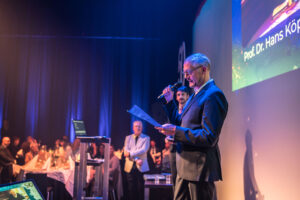
Matthias Köpp. Picture by PDF-Grafie.
Now I may be here in his place, and although I am not a professional colleague of yours – I am a psychiatrist and psychotherapist – it does not feel at all strange for me to be with you. On the contrary! First of all Alfred Toepfer, the founder of this medal is no stranger for me. This is not only because I live in Hamburg nowadays, where his name is ever present. I remember a walk with him and my father with some official group in what must have been the late 1970s through “Lüneburger Heide Nature Park”, from Niederhaverbek to Wilsede. In my memories Toepfer was a relatively small man already in his early 80s, but very good on foot indeed.
Even further back in time now. Shortly after my father completed his PhD at Göttingen University in 1966, he went to England for a year to complete a program for foreign scholars at the Department of Forestry and Agriculture at Oxford University. He finished the program with a thesis on “Problems and politics in the creation of National Parks in Great Britain: a comparison with West German experiences”. So his interest for protected areas goes back at least until then. And it so happened that I was born in Oxford, and my parents took me in their VW Beetle, as a baby boy, on a trip through all the British National Parks. A photo with me on a blanket in beautiful surroundings still exists.
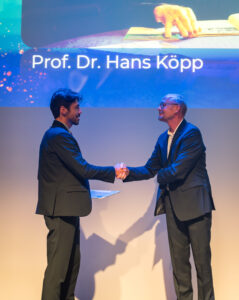
Michael Hošek and Dr. Matthias Köpp. Picture: PDF-Grafie.
Later, our family spent their vacation almost exclusively where the EUROPARC Federation held its annual meetings. While Hans was attending the conferences, our mother, my younger brother and I were on holiday, and part of the story is as well, that we often didn’t see much of him… But that’s how I got through so many European National Parks. I remember visits especially to the “Peak District” in North Yorkshire, to the Bavarian Forest, to the Dutch island of Texel and to Lake Vättern in Sweden. Special personal memories of mine are connected with “Plitvice National Park” in Croatia in what was then Yugoslavia. For us, that was behind the “Iron Curtain” of a divided Europe, and far from an everyday experience. After two or three weeks of vacation on a small farm and in spectacular nature, our family spent the last evening with the then director Josip Movcan, his wife Maria and his daughter Jasna, and I said “but I do not want to go home”. Without further ado, it was decided that I, by then a boy of twelve, would simply stay for another week with Josip’s family, who afterwards put me on a plane home in Zagreb. And further on, I spent the following summer all alone with Josip’s family in Plitvice.
You can for sure imagine what a pleasure it was for me to be able to watch your interview with my father on YouTube recently. And from my own professional point of view it was of special pleasure to hear that he emphasized the aspect of connecting people as a central task for EUROPARC Federation’s future work. One of your mottos is “connecting people with nature”. I might suggest that you quote “connecting people in nature” as well. Maybe my personal memories can help prove that, at least concerning me, you already did!
With this in mind, I would like to take the opportunity to congratulate you on your fiftieth birthday and wish you all the best and success for your future work. As you heard my father saying in the interview, he was convinced that on its hundredth birthday, EUROPARC Federation will still be there and no less necessary or important than it was in 1973.
Thank you very much!”
The Alfred Toepfer Medal is made possible thanks to the generous support of the Alfred Toepfer Stiftung.
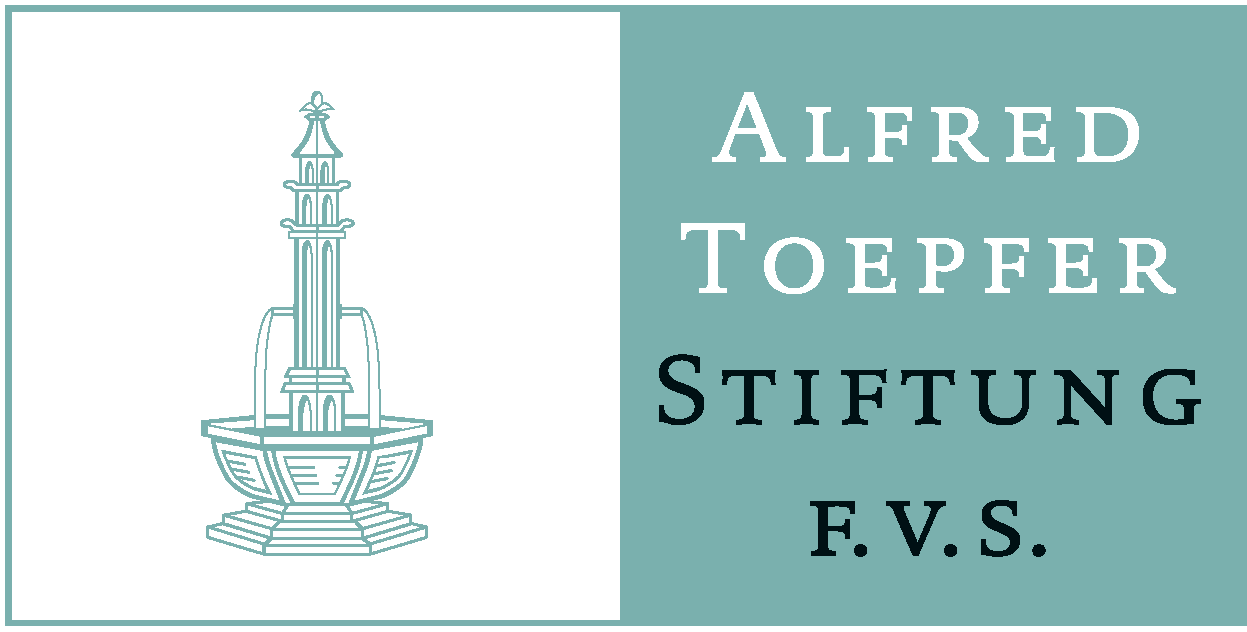
Meet the Alfred Toepfer Scholarship winners 2023!
From left to right: Andreas Holz of the Alfred Toepfer Siftung, Lucia Ursu, Emmanuele Déon, Hayden Bridgeman and EUROPARC President Michael Hošek. Picture by PDF-Grafie for the EUROPARC Federation.
Every year, the EUROPARC Federation grants three scholarships to young professionals, in order for them to conduct study visits on their chosen topic. Get to know the three winners of 2023! The scholarships are made possible thanks to the generous support of the Alfred Toepfer Stiftung.
About the Alfred Toepfer Natural Heritage Scholarship
EUROPARC strongly believes that young professionals have a vital role to play in caring for Europe’s natural heritage. Like everything else, the future of Protected Areas relies on the young generation taking an active and informed role. Each year the EUROPARC Federation, with support from the Alfred Toepfer Stiftung F.V.S., awards three Alfred Toepfer Natural Heritage Scholarships to promising young conservationists, who are committed to working for the benefit of Protected Areas. The aim of the scholarships is to enhance international cooperation and to advance the quality, innovation and European dimension of Protected Area management. Meet the winners of the 2023 edition:
Emmanuelle Déon
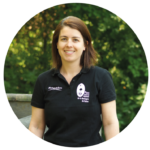
Emmanuelle
“My name is Emmanuelle Déon and I work as a Sustainable tourism project manager for Montagne de Reims Regional Park. My role is to engage with stakeholders in developing projects that make the Park more accessible to visitors, mainly through outdoor activities and soft mobilities. Tourism and leisure in Parks are a great way to raise people’s awareness of the beauty of nature, but are also challenging because we have to make sure that these activities don’t result in negative environmental impacts. My scholarship project is to study how Parks can get involved in developing social tourism, for a more inclusive and equitable access to sustainable tourism towards people in risk of poverty. I have a strong interest in the social pillar of sustainability because I believe it is our collective responsibility, as a society, to care for the most vulnerable populations. I aim at visiting several Protected Areas in Europe which have worked on this issue, in order to identify and disseminate best practices within European Parks.”
Hayden Bridgeman
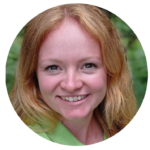
Hayden
“My name is Hayden Bridgeman and I am North Area Ranger for the New Forest National Park Authority. My role is to help visitors and locals learn about what makes the National Park special, how they can enjoy the area, and offer advice about how to help protect it. I have a huge passion for making nature inclusive, and believe that everybody should be able to access green spaces. We, as a society, are increasingly aware of how crucial nature is to good mental health, yet those that need it most are often unable to access it. I am currently leading on a local initiative to enable refugees to access the UK’s National Parks and I want to continue to learn how I can remove more of the barriers this community faces when accessing nature. This scholarship allows me to learn from other professionals about some of the opportunities they have created in their Protected Areas for marginalised communities. I am so grateful for this opportunity and hope my findings will be useful to my European colleagues.”
Lucia Ursu
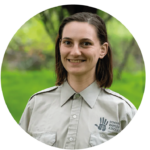
Lucia
“My name is Lucia Ursu. As an educator in Protected Areas, I have witnessed first-hand the vital role that parks play in promoting sustainable development and preserving our natural heritage. I strongly believe that Education for Sustainable Development (ESD) is crucial in our efforts to create a more sustainable future not just for Protected Areas but for nature in general. Through ESD we can change perspectives and shift attitudes towards more sustainable behaviours. Being an Alfred Toepfer Natural Heritage Scholarship winner brings me a unique opportunity to further develop my skills and knowledge in the field of ESD, enables me to expand my expertise and deepen my understanding of ESD and lets me connect with other professionals working towards a more sustainable future. I am committed to using the knowledge and skills I gain through the scholarship to make a positive impact in my community and beyond, and to contribute to the achievement of the Sustainable Development Goals.”